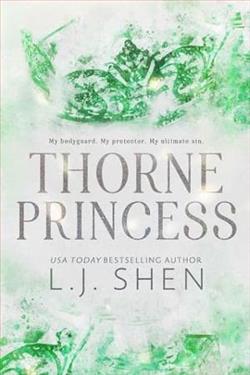Wilf said: “I doubt we’ll need to write anything down.”
Wynstan was distracted by a tall woman of about thirty wearing a torn red dress. She was attractive, despite the ash smeared on her cheek. She spoke in a low voice, but he could hear the desperation in her tone. “You must help me, my lord bishop, I beg you,” she said.
Wynstan said: “Don’t talk to me, you stupid bitch.”
He knew her. She was Meagenswith, known as Mags. She lived in a large house with ten or twelve girls—some slaves, others volunteers—all of whom would have sex with men for money. Wynstan replied without looking at her. “You can’t be the first person in Combe I commiserate with,” he said, speaking quietly but urgently.
“But the Vikings took all my girls as well as my money!”
They were all slaves now, Wynstan thought. “I’ll discuss it with you later,” he muttered. Then he raised his voice for the benefit of people nearby. “Get out of my sight, you filthy fornicator!”
She backed away immediately.
Two monks brought a big oak chair and set it in the middle of the open space. Wilf sat down, Wigelm stood on his left, Wynstan on his right.
While the townspeople gathered around, the brothers held a worried conversation in low tones. All three drew income from Combe. It was the second most important town in the ealdormanry, after the city of Shiring. Every house paid rent to Wigelm, who shared the proceeds with Wilf. The people also paid tithes to the churches, which shared them with Bishop Wynstan. Wilf collected customs duties on imports and exports passing through the harbor. Wynstan took an income from the monastery. Wigelm sold the timber in the forest. As of two days ago, all those streams of wealth had dried up.
Wynstan said grimly: “It will be a long time before anyone here can pay anything.” He would have to reduce his spending. Shiring was not a rich diocese. Now, he thought, if I were archbishop of Canterbury I would never need to worry: all the wealth of the Church in the south of England would be under my control. But as mere bishop of Shiring he was limited. He wondered what he could cut out. He hated to renounce a pleasure.
Wigelm was scornful. “All these people have money. You find it when you slice their bellies open.”
Wilf shook his head. “Don’t be stupid.” It was something he said often to Wigelm. “Most of them have lost everything,” he went on. “They have no food, no money to buy any, and no means of earning anything. Come wintertime they’ll be gathering acorns to make soup. Those who survived the Vikings will be enfeebled by hunger. The children will catch diseases and die; the old will fall over and break their bones; the young and strong will leave.”
Wigelm looked petulant. “Then what can we do?”
“We will be wise to reduce our demands.”
“We can’t let them live rent free!”
“You fool, dead people pay no rent. If a few survivors can get back to fishing and making things and trading, they may be able to recommence payments next spring.”
Wynstan agreed. Wigelm did not, but he said no more: Wilf was the eldest and outranked him.
When everyone was ready, Wilf said: “Now, Prior Ulfric, tell us what happened.”
The ealdorman was holding court.
Ulfric said: “The Vikings came two days ago, at the glimmer of dawn, when all were asleep.”
Wigelm said: “Why didn’t you fight them off, you cowards?”
Wilf held up a hand for silence. “One thing at a time,” he said. He turned to Ulfric. “This is the first time Vikings have attacked Combe in my memory, Ulfric. Do you know where this particular group came from?”
“Not I, my lord. Perhaps one of the fishermen might have seen the Viking fleet on their voyages?”
A burly man with gray in his beard said: “We never see them, lord.”
Wigelm, who knew the townspeople better than his brothers did, said: “That’s Maccus. He owns the biggest fishing boat in town.”
Maccus went on: “We believe the Vikings make harbor on the other side of the Channel, in Normandy. It’s said they take on supplies there, then raid across the water, and go back to sell their loot to the Normans, God curse their immortal souls.”
“That’s plausible, but not very helpful,” Wilf said. “Normandyhas a long coastline. I suppose Cherbourg must be the nearest harbor?”
“I believe so,” Maccus said. “I’m told it’s on a long headland that sticks out into the Channel. I haven’t been there myself.”
“Nor have I,” said Wilf. “Has anyone from Combe been there?”
“In the old days, perhaps,” said Maccus. “Nowadays we don’t venture so far. We want to avoid the Vikings, not meet them.”















